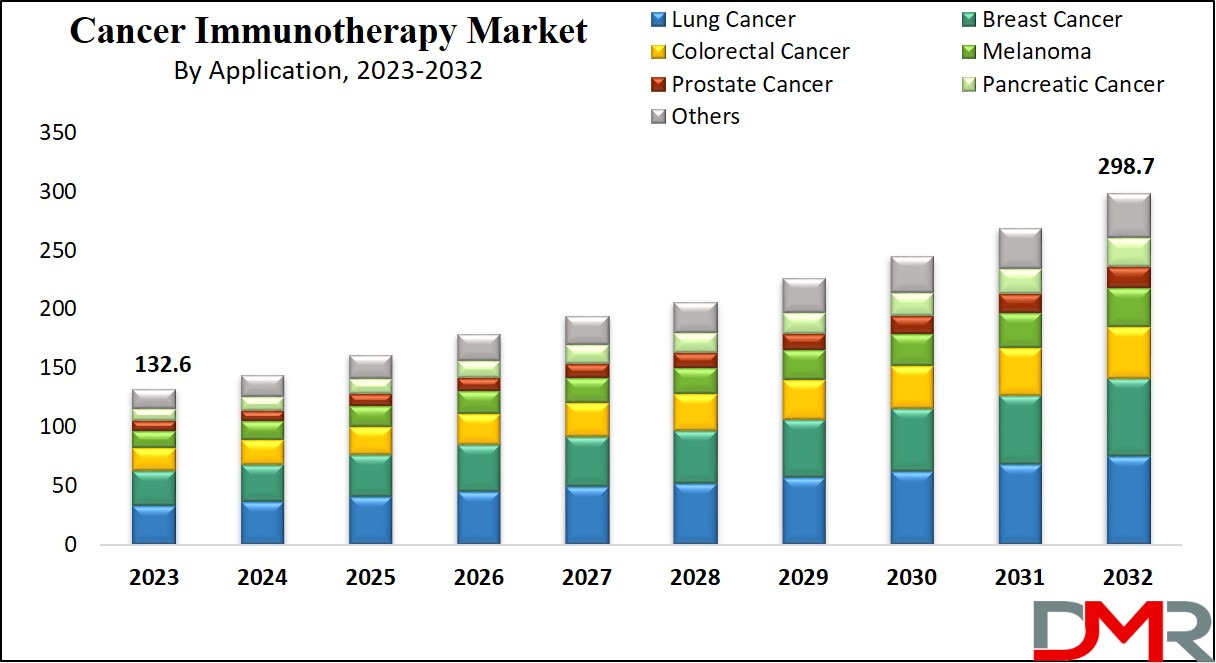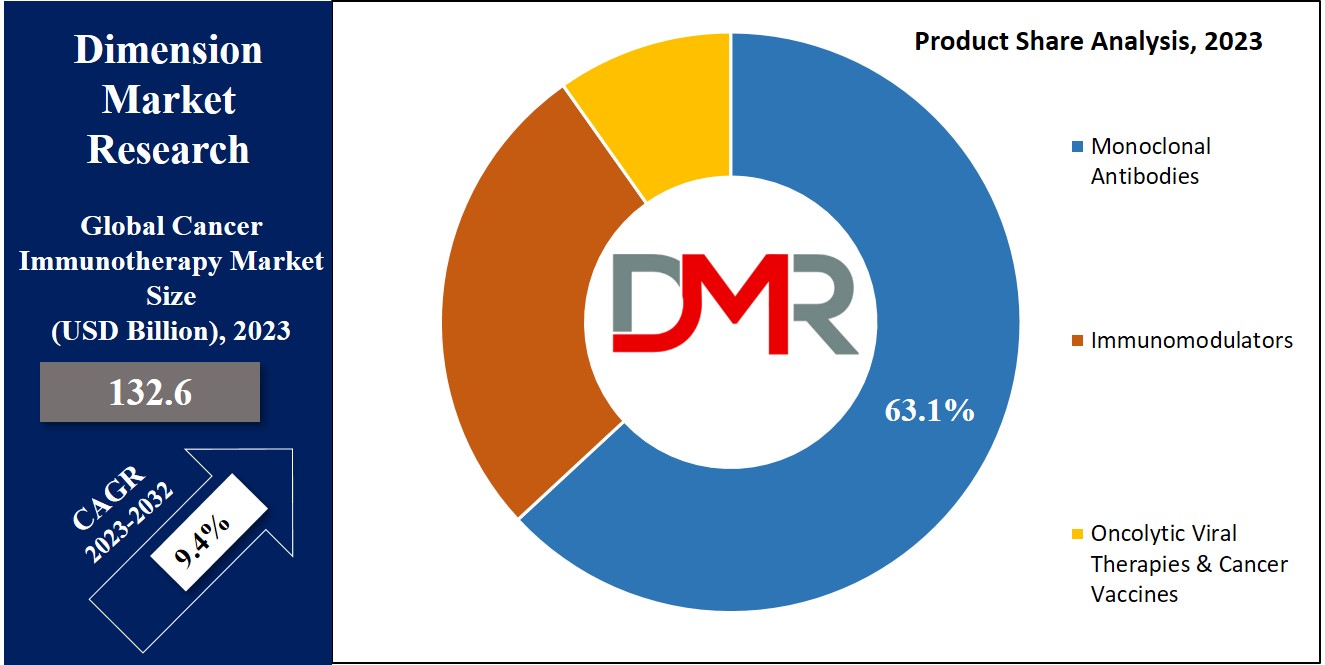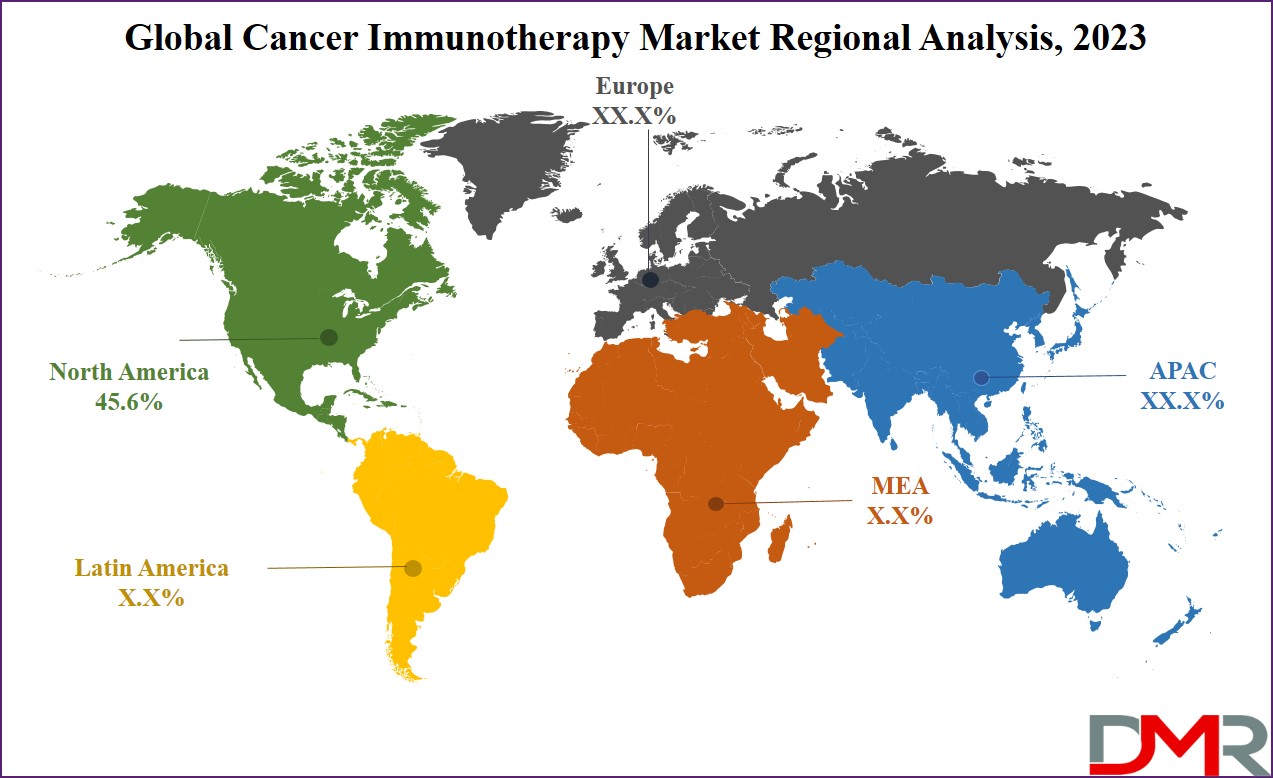Cancer Immunotherapy Market Overview
The Global Cancer Immunotherapy Market is expected to reach a value of USD 132.6 billion in 2023, and it is further anticipated to reach a market value of USD 298.7 billion by 2032 at a CAGR of 9.4%.
Immunotherapy controls the body's immune system to fight diseases like cancer. It either improves the natural immune response to target cancer cells more effectively or introduces artificial immune system proteins. By using substances produced by the body or in a laboratory, cancer immunotherapy enhances the immune system, empowering it to identify & eliminate cancer cells, thereby fortifying the body's innate defenses against the disease.

An increasingly prevalent cancer epidemic is driving demand for cancer immunotherapy treatments. According to estimates by the International Agency for Research on Cancer (IARC), there were approximately 19.29 million cancer cases in 2020; that number is projected to more than double by 2030 and requires innovative solutions if we want a global market to remain healthy and vibrant. This increasing burden also propels the need for
Next Generation Cancer Diagnostics, which play a critical role in identifying patients most suitable for immunotherapy treatments.
Strategic initiatives by key industry players are also helping the market expand. In September 2023, Immatics and Moderna collaborated on cancer therapeutics using Immatics' PRAME203 TCRT with Moderna's MARTE mRNA cancer vaccine; similarly in August 2023 FBD Biologics Limited joined forces with Shanghai Henlius Biotech, Inc. to explore novel immunotherapies. Such initiatives strengthen market expansion.
Cancer Immunotherapy Market Key Takeaways
- Market Size & Share: Cancer Immunotherapy Market is expected to reach a value of USD 132.6 billion in 2023, and it is further anticipated to reach a market value of USD 298.7 billion by 2032 at a CAGR of 9.4%.
- Growing Demand: Increasing cancer incidence worldwide drives the adoption of immunotherapies as they offer targeted, effective, and less invasive treatment options.
- Technological Advancements: Innovations like CAR-T cell therapies and immune checkpoint inhibitors are transforming cancer treatment and expanding therapeutic possibilities.
- Challenges in Accessibility: High costs and complex manufacturing processes limit access to advanced immunotherapies, particularly in developing regions.
- Precision Medicine Impact: Biomarker-driven therapies and companion diagnostics are shaping the future of personalized cancer treatments.
- Future Growth Drivers: Rising R&D investments, combination therapies, and supportive regulatory environments are fueling market expansion.
- Regional Analysis: North America has a 45.6% share of revenue in the Global Cancer Immunotherapy Market in 2023
Cancer Immunotherapy Market Use Cases
- Checkpoint Inhibitors: Drugs like PD-1/PD-L1 and CTLA-4 inhibitors help the immune system recognize and attack cancer cells more effectively.
- CAR-T Cell Therapy: Genetically modified T cells are used to target and destroy specific cancer cells, particularly in blood cancers like leukemia and lymphoma.
- Cancer Vaccines: Therapeutic vaccines stimulate the immune system to prevent cancer recurrence or target specific tumor antigens.
- Monoclonal Antibodies (mAbs): Engineered antibodies directly attack cancer cells or deliver toxic agents to tumors, improving treatment precision.
- Oncolytic Virus Therapy: Genetically modified viruses selectively infect and destroy cancer cells while stimulating an immune response against tumors.
Cancer Immunotherapy Market Dynamic
During the forecasted period significant growth in the global cancer immunotherapy market can be seen, driven by the growing preference for immunotherapy over traditional treatments, the broad number of cancers, & an increased need for cancer monoclonal antibodies.
The market is further driven by the expansion of bioinformatics equipment, providing improved alternatives for drug development, as well as the growth in the popularity of patient assistance programs. In addition, a strong pipeline of pledged innovations contributes to the positive outlook for the sector.
However, the market faces impediments, like the copyright expiry of key drugs, inadequate screening, and diagnostic infrastructure in many emerging nations, potential side effects, exorbitant costs associated with developing innovative drugs, & strict regulatory frameworks from various governments create hurdles to the seamless growth of the global cancer immunotherapy market.
Driving Factors
The increasing global incidence of cancer is a key driver for the
cancer immunotherapy market. As cancer cases surge due to aging populations, lifestyle changes, and environmental factors, demand for innovative treatments grows. Immunotherapies, such as checkpoint inhibitors, CAR T cell therapy, and cancer vaccines, offer targeted approaches that boost the body’s immune system to fight cancer.
Moreover, advancements in personalized medicine and biomarker identification are enhancing treatment efficacy. Governments and organizations are increasing funding for cancer research, further accelerating the development and adoption of immunotherapies as they offer better survival rates and fewer side effects than traditional treatments.
Trending Factors
Combination therapies have become an emerging trend in cancer immunotherapy markets, as their efficacy improves and resistance mechanisms are overcome. Checkpoint inhibitors combined with kinase inhibitors or monoclonal antibodies have shown promising results in clinical trials, driven by precision medicine's rise, which allows tailored combinations based on each patient's genetic profile.
Pharmaceutical companies are making considerable investments in clinical trials to explore combinations, in an attempt to expand their therapeutic indications and expand oncology treatments by improving outcomes and decreasing relapse rates. This approach could prove revolutionary.
Restraining Factors
The high cost of cancer immunotherapies remains an obstacle to market expansion. CAR T cell therapy alone may cost hundreds of thousands of dollars per patient, making these advanced therapies inaccessible for many. Furthermore, their development and production involve complicated processes and significant investment, further driving up prices.
Limited insurance coverage further restricts patient access; this financial strain places strain on healthcare systems across lower and middle income countries alike; efforts such as streamlining manufacturing operations, improving scalability and creating biosimilar versions are critical in making cancer immunotherapies more cost effective and widely accessible.
Opportunity
Biomarker research represents an exciting development in cancer immunotherapy market. By helping identify patients most likely to respond favorably to specific immunotherapies, biomarkers allow treatment providers to optimize treatment success rates while simultaneously limiting side effects. Advances in genomic and proteomic technologies are aiding the discovery of novel biomarkers, leading to personalized medicine approaches.
Pharmaceutical companies are taking advantage of these advances to develop targeted therapies and companion diagnostics more quickly and efficiently, optimizing drug development pipelines. With healthcare systems prioritizing precision medicine, biomarker driven immunotherapies may become even more widely deployed creating new opportunities for market expansion while improving patient outcomes globally.
Cancer Immunotherapy Market Research Scope and Analysis
By Product
The
monoclonal antibodies segment takes the lead in the global cancer immunotherapy market in 2023, claiming the largest market share and is expected to have steady growth throughout the forecast period, which is due to several factors, like targeted effectiveness, a high prescription rate, minimal side effects, & strong commercial performance of key monoclonal antibodies like Keytruda, Yervoy, and Opdivo.
Further, oncolytic viral therapies & cancer vaccines emerge as the most sought-after segment in the projected period, as the increasing demand for innovative treatment approaches, a growing interest in cancer vaccines, & a rise in financial support from both governmental & non-governmental sectors for the development of new
oncology vaccines are expected to drive the major need for this segment in the years to come.

By Application
In terms of application, the lung cancer segment emerged as the leading segment in the market, driven by factors like a rise in the incidence of lung malignancies, growth in the adoption of immunotherapy, awareness programs, & a strong pipeline of investigational candidates. The segment's expansion is further driven by a rise in product approvals & launches, indicating a positive trajectory for future demand.
Moreover, the breast cancer segment secured the second-largest share, boosted by the disease's high prevalence, ongoing research endeavors, & major investments by key players in developing innovative therapeutics for breast malignancies. Further, the prostate cancer segment is expected for the fastest growth rate during the forecast period, highlighting a rising demand for advanced therapeutic solutions in the field of prostate cancer treatment.
By Distribution Channel
The hospital pharmacy segment takes the lead in the market, commanding a significant market share, as the growth of hospital pharmacies is driven by the rise in demand for immunotherapy within hospital settings & the concurrent rise in hospitalization due to a growth in oncology disorders. The complex cancer treatment, along with an aging population, has contributed to an increase in the rate of hospitalization among cancer patients, supporting the segment's substantial market share.
Moreover, the online pharmacy segment is expected to witness the most rapid growth in the upcoming years, which is attributed to factors like a surge in telemedicine adoption, the expanding reach of the internet, increased technological integration, & the inherent benefits of convenience &time efficiency. Also, the presence of prominent e-pharmacy players, along with enticing discounts, further fuels the anticipated demand for the online pharmacy segment in the coming future.
By End User
The global cancer immunotherapy market experienced a significant impact from the hospitals and clinics sector, which has emerged as the revenue leader in 2023 & is expected to maintain this dominance, attributed to a surge in hospital admissions for cancer treatment, along with the growing number of government and private hospitals globally.
Patients prefer these institutions for many cancer treatments, supporting the increasing presence of hospitals & the adoption of advanced technologies, which is expected to fuel the segment's continued growth.
Moreover, the cancer research institutions segment provides promising opportunities in the forecast period. Driven by an increase in corporate & government investments in cancer treatment research & the exploration of immunotherapies, this segment is anticipated to flourish.
The Cancer Immunotherapy Market Report is segmented on the basis of the following:
By Product
- Monoclonal Antibodies
- Immunomodulators
- Oncolytic Viral Therapies & Cancer Vaccines
By Application
- Lung Cancer
- Breast Cancer
- Colorectal Cancer
- Melanoma
- Prostate Cancer
- Pancreatic Cancer
- Other
By Distribution Channel
- Hospital Pharmacy
- Retail Pharmacy
- Online Pharmacy
By End User
- Hospitals & Clinics
- Cancer Research Centers
- Others
How Does Artificial Intelligence Contribute To Improve Cancer Immunotherapy Market ?
- Drug Discovery & Development – AI accelerates the identification of new immunotherapy drugs by analyzing vast biological datasets and predicting drug-target interactions.
- Personalized Treatment Plans – AI-driven algorithms analyze patient genomics and biomarkers to tailor immunotherapy treatments for maximum effectiveness.
- Early Cancer Detection – AI enhances diagnostic accuracy by detecting cancer biomarkers and immune responses from imaging and genomic data.
- Optimizing Clinical Trials – AI helps in patient selection and trial design, increasing success rates and reducing the time for new immunotherapies to reach the market.
- Monitoring Treatment Response – AI-powered tools track immune system responses in real-time, allowing adjustments to immunotherapy regimens for better outcomes.
Cancer Immunotherapy Market Regional Analysis
North America stands as the dominant region in the global cancer immunotherapy market, contributing a substantial
45.6% to the total revenue in 2023, and is expected to maintain this stronghold in the forecast period, which is driven by a higher incidence of cancer in the region, along with a notable adoption of cancer immunotherapy among the population.
Further, Europe emerges as a highly opportunistic market in the upcoming forecast period. The region faces a growth in cancer cases & related deaths, with a significant impact on the elderly population aged 65 years & above. Further, breast cancer takes the lead as the most diagnosed cancer across European countries in 2022, as all these factor positions Europe as a promising arena for growth and advancement in cancer immunotherapy research and adoption.

By Region
North America
Europe
- Germany
- The U.K.
- France
- Italy
- Russia
- Spain
- Benelux
- Nordic
- Rest of Europe
Asia-Pacific
- China
- Japan
- South Korea
- India
- ANZ
- ASEAN
- Rest of Asia-Pacific
Latin America
- Brazil
- Mexico
- Argentina
- Colombia
- Rest of Latin America
Middle East & Africa
- Saudi Arabia
- UAE
- South Africa
- Israel
- Egypt
- Rest of MEA
Cancer Immunotherapy Market Competitive Landscape
The cancer immunotherapy market experiences intense competition with a limited number of major players holding significant market shares, as these players play a vital role in shaping the market landscape. Further, substantial investments in R&D for cancer therapy by these industry leaders, along with a rising number of product approvals, serve as critical drivers propelling the overall growth of the market.
In June 2023, ImmunoGenesis, & Cancer Focus Fund, LP, in collaboration with The University of Texas MD Anderson Cancer Center, announced a USD 4.5 million investment plan for the Phase 1a/1b clinical trial of ImmunoGenesis' lead candidate, IMGS-001, which targets immune-excluded tumors resistant to current immunotherapy.
Some of the prominent players in the global Cancer Immunotherapy Market are
- Lilly
- Novartis
- Pfizer
- Immunocore
- Johnson & Johnson
- Merk & Co
- AstraZeneca
- Amgen
- Bayer AG
- Seattle Genetics
- Other Key Players
Cancer Immunotherapy Market Recent Developments
- In September 2023, a team of researchers, including those from Northwestern University, secured a USD 45 million grant from the Advanced Research Projects Agency for Health (ARPA-H) to expedite the development of a implant for sensing & treating cancer. Further Northwestern's project marks the second program funded by ARPA-H's inaugural Open Broad Agency Announcement solicitation for research proposals.
- In September 2023, the US FDA modified its 2021 accelerated approval of the immunotherapy drug pembrolizumab for certain individuals with advanced stomach and gastroesophageal junction cancer, as initially approved in combination with trastuzumab & chemotherapy for advanced HER2-positive cases, the amendment is based on updated results from the KEYNOTE-811 trial. Further, the revised approval indicates effectiveness specifically in patients with elevated PD-L1 levels, constituting about 85% of the trial participants.
- In August 2023, the NHS in England got approval from the Medicines & Healthcare products Regulatory Agency (MHRA) to develop an advance seven-minute injection method for administering the immunotherapy atezolizumab (Tencentriq) involving subcutaneous injections under the skin, replacing the traditional 30-minute to hour-long intravenous transfusion in hospitals. The switch and more comfortable delivery are expected to enhance the experience for hundreds of eligible patients, saving valuable time for NHS cancer teams.
| Report Characteristics |
| Market Size (2023) |
USD 132.6 Bn |
| Forecast Value (2032) |
USD 298.7 Bn |
| CAGR (2023-2032) |
9.4% |
| Historical Data |
2017 - 2022 |
| Forecast Data |
2023 - 2032 |
| Base Year |
2022 |
| Estimate Year |
2023 |
| Report Coverage |
Market Revenue Estimation, Market Dynamics, Competitive Landscape, Growth Factors and etc. |
| Segments Covered |
By Product (Monoclonal Antibodies, Immunomodulators, and Oncolytic Viral Therapies & Cancer Vaccines), By Application (Lung Cancer, Breast Cancer, Colorectal Cancer, Melanoma, Prostate Cancer, Pancreatic Cancer, and Other), By Distribution Channel (Hospital Pharmacy, Retail Pharmacy, and Online Pharmacy), By End User (Hospitals & Clinics, Cancer Research Centers, and Others) |
| Regional Coverage |
North America – The US and Canada; Europe – Germany, The UK, France, Russia, Spain, Italy, Benelux, Nordic, & Rest of Europe; Asia- Pacific– China, Japan, South Korea, India, ANZ, ASEAN, Rest of APAC; Latin America – Brazil, Mexico, Argentina, Colombia, Rest of Latin America; Middle East & Africa – Saudi Arabia, UAE, South Africa, Turkey, Egypt, Israel, & Rest of MEA |
| Prominent Players |
Lilly, Novartis, Pfizer, Immunocore, Johnson & Johnson, Merk & Co, AstraZeneca, Amgen, Bayer AG, Seattle Genetics, and Other Key Players |
| Purchase Options |
We have three licenses to opt for: Single User License (Limited to 1 user), Multi-User License (Up to 5 Users), and Corporate Use License (Unlimited User) along with free report customization equivalent to 0 analyst working days, 3 analysts working days and 5 analysts working days respectively. |
Frequently Asked Questions
The Global Cancer Immunotherapy Market size is estimated to have a value of USD 132.6 billion in 2023
and is expected to reach USD 298.7 billion by the end of 2032.
North America has the largest market share for the Global Cancer Immunotherapy Market with a share
of about 45.6% in 2023.
Some of the major key players in the Global Cancer Immunotherapy Market are Lilly, Novartis, Pfizer,
and many others.
The market is growing at a CAGR of 9.4 percent over the forecasted period.